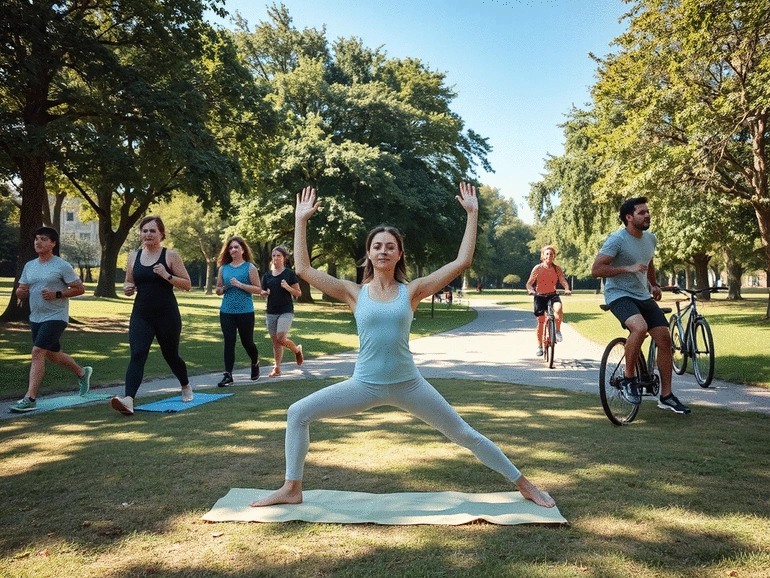
Did you know that regular exercise can significantly boost your mental health? In today's fast-paced world, understanding the connection between physical activity and mental well-being is essential for managing stress and anxiety effectively.
Exercise is a powerful tool for managing stress and anxiety, influencing mood, resilience, and physiological responses. Below is a visual representation of how physical activity affects key aspects of mental health.
Exercise boosts natural mood lifters, promoting feelings of calm and happiness.
Physical activity helps lower and regulate stress hormone (cortisol) levels.
Regular exercise fosters better sleep, crucial for mental recovery and resilience.
Consistent activity builds mental strength to cope with life's challenges more effectively.
As someone who has spent over a decade studying stress, I can confidently say that our mental and physical health are intricately linked. Exercise is not just about physical fitness—it plays a significant role in enhancing mental well-being, particularly when it comes to managing stress and anxiety. Let’s dive into this connection and uncover why incorporating exercise into our routines can be a game-changer for our mental health.
Understanding how stress and anxiety affect us is the first step in addressing them. These conditions can create a vicious cycle, leading to physical symptoms and emotional turmoil. By recognizing the psychological landscape of stress, we can start to see how exercise can pave the way for relief and resilience.

Stress and anxiety aren’t just fleeting feelings; they can become chronic and deeply affect our daily lives. Psychological responses to stressors activate our body's fight-or-flight mechanisms, which can lead to feelings of overwhelm. It’s essential to recognize these triggers, as understanding them is a key component in managing anxiety effectively.
By pinpointing these aspects, we can begin to develop personalized strategies, such as exercise, to cope with stress more effectively. Just as each person's triggers are unique, so too are the paths to finding relief.
Engaging in regular physical activity can significantly impact our mental health. Exercise releases endorphins, our body's natural mood lifters. This chemical response can lead to immediate feelings of calm and happiness. Not only does this improve our mood, but it also fosters resilience against stress.
Over time, establishing a consistent exercise routine can help create a buffer against life’s stressors. When we feel stronger physically, we also cultivate a sense of strength mentally, empowering us to handle challenges with more grace.
Understanding cortisol—the hormone associated with stress—adds another layer to this discussion. Elevated cortisol levels can wreak havoc on our mental and physical health. Regular exercise can help regulate these levels, effectively managing stress responses. This is why incorporating exercise into our lives is not just beneficial; it’s essential for maintaining a balanced mental state, as further explored by research on physical activity and chronic stress.
As we explore the intricacies of stress and its management, it becomes evident that exercise is a powerful tool in our mental health toolkit. The more we understand its benefits, the more motivated we can become to embrace it as part of our daily lives.
Incorporating even short bursts of physical activity into your day can significantly enhance your mental well-being. Try setting a timer for just 5-10 minutes to stretch, take a brisk walk, or do a quick workout. These small efforts can break the cycle of stress and refresh your mind, making a noticeable difference in how you feel throughout the day.
As we explore the many benefits of exercise, it becomes clear that staying active is essential for our mental health. Regular physical activity not only helps manage stress but also plays a significant role in reducing anxiety levels. By incorporating exercise into our daily lives, we can experience improvements in our mood, resilience, and overall well-being. Here are the key takeaways:
In my practice at Stress Insight Solutions, I've seen firsthand how these benefits manifest in my clients' lives. Incorporating even small doses of physical activity can lead to significant changes in how we handle everyday stressors.

Staying active is not just about physical fitness; it’s a comprehensive approach to mental health. Here’s a summary of how exercise impacts our psychological landscape:
Incorporating exercise into your life doesn’t have to be daunting. Start with simple activities that fit your lifestyle, and gradually increase your commitment. It’s about finding what works best for you!
Now that we've discussed the impressive impact of exercise on mental health, it’s time to take action. If you're looking to start your journey toward reduced stress, here are some practical steps to guide you:
These steps can help create a solid foundation for incorporating exercise into your routine. Remember, it's about progress, not perfection!
There are numerous resources available to help you on your journey to better mental health through exercise. At Stress Insight Solutions, we provide a wealth of information and practical tools to support your efforts:
Utilizing these resources can empower you to create an actionable plan that aligns with your unique stress management goals.
Taking the first step can be the hardest part, but I encourage you to embrace it! Remember that every little bit counts. Whether it's a brisk walk around the block or a yoga session at home, the key is to get moving. The journey toward wellness is about small, consistent changes that add up over time.
As you venture into this new chapter, remind yourself that the path to mental well-being is not a race. Celebrate your achievements along the way, and don’t hesitate to reach out for support. You’re not alone in this journey!
In addition to exercise, consider integrating other lifestyle modifications that can support your mental health:
By addressing these aspects of your life, you can create a holistic approach to stress management that fosters emotional resilience and well-being. Remember, at Stress Insight Solutions, we’re here to guide you every step of the way!
Here is a quick recap of the important points discussed in the article:
We illuminate the causes and effects of stress through science-informed resources, empowering you to recognize stressors and implement effective coping strategies. Your mental well-being is our priority.
